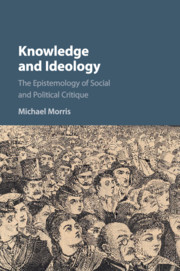Part II - On Ideology and Violence
Published online by Cambridge University Press: 17 November 2016
Summary
In Part I we considered the epistemic implications that attend the broad dissemination of functional ideology critique. We considered how this critique tends to undermine our confidence in all convictions and cognitive practices by revealing their noncognitive sources, effects, and associations. Construed as a liberational practice, the functional critique of ideology ultimately turns against itself, undermining the rational justification for its initially liberational aims, perhaps even the epistemic coherence of its generated knowledge claims.
In Part II we turn the critique of ideology against itself in an attempt to develop an inherently social and volitionally structured conception of knowing. We apply the critique of ideology to the history of its own development, considering (a) the social aims that animate its emergence and (b) the ultimate effects it obtains. Through an examination of Rousseau's Second Discourse (Chapter 3) and Stirner's The Ego and Its Own (Chapter 4), I show that the specifically functional critique of ideology acquires a fully developed form prior to Marx's inaugural discussions of ideology, and I argue that the functional form of ideology critique emerges from – or at least becomes deeply tainted with – social aspirations that diverge markedly from the concerns of traditional Marxism. While traditional Marxism represents the sustained attempt to comprehend and alleviate the poverty, exploitation, and human degradation that accompany industrial capitalism, the functional critique of ideology often emerges from the attempt to articulate an increasingly common experience of all human relations, customs, habits, and social roles as nothing but externally imposed fetters upon the true, embodied, and increasingly elusive self.
In addition to revealing the basic experience or aim that often underlies the functional critique of ideology, we turn to consider its frequent effect: the glorification and even apotheosis of violence. As all binding relations, shared norms, and common practices reveal themselves to be nothing but the instruments of subtle and insidious manipulation, many thinkers – here we consider Stirner, Nietzsche, Sorel, Benjamin, Jünger, Johst, Hitler, and Sartre – conclude that constant struggle and self-aggrandizement constitute the essence of social reality, perhaps even the essence of life itself.
- Type
- Chapter
- Information
- Knowledge and IdeologyThe Epistemology of Social and Political Critique, pp. 95 - 98Publisher: Cambridge University PressPrint publication year: 2016

